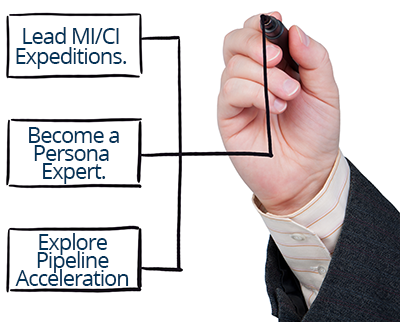Tips for Healthcare Marketers in a Relationship-Based Sales Process
I’ve recently spoken with many healthcare marketers who are frustrated that they can’t contribute as much to demand generation as they’d like because their segments are dominated by a relationship-based sales approach. In these cases, sales leadership may be hesitant to embrace more traditional marketing programs, even if they are laser-targeted. What is a healthcare marketer to do? Are we doomed to an agonizingly slow death by PowerPoint?
 Here are a couple ideas for healthcare marketers to remain strategic, even in portions of the industry that are dominated by relationship-based sales.
Here are a couple ideas for healthcare marketers to remain strategic, even in portions of the industry that are dominated by relationship-based sales.
- Lead market intel (MI)/competitive intel (CI) expeditions. MI and CI are particularly valued by sales teams that are geographically diffuse. Providing a methodology for collecting, tracking, synthesizing and distributing this information can be a great way for marketing to earn credibility with sales partners, particularly if MI/CI is not a recognized, independent discipline at your organization.
- Become a persona expert. If you’re lucky, your sales executives know their customers and prospects well. But that’s just it – they know their customers. If you can provide sales with insights into their target personas – e.g. “a day in the life of a chief medical officer,” you’ll help them home in on issues that matter.
- Explore pipeline acceleration programs. Rapid-entry pipeline programs can help sales qualify leads more quickly. These types of programs may be appropriate if sales is targeting a new buying center but lacks a clear line of sight into who the best prospects are. Intra-pipeline programs help get qualified leads unstuck in the buying process. Marketing programs may be able to identify a key pain point that makes the buying need more acute. Last-mile programs help buyers get across the finish line. You may be able to construct different offers and advise sales which one is more effective.
Don’t let “value prop-itis” get you down. There is a ton of strategic work to be done by healthcare marketers, even at organizations that may not rely heavily on marketing-sourced lead generation.